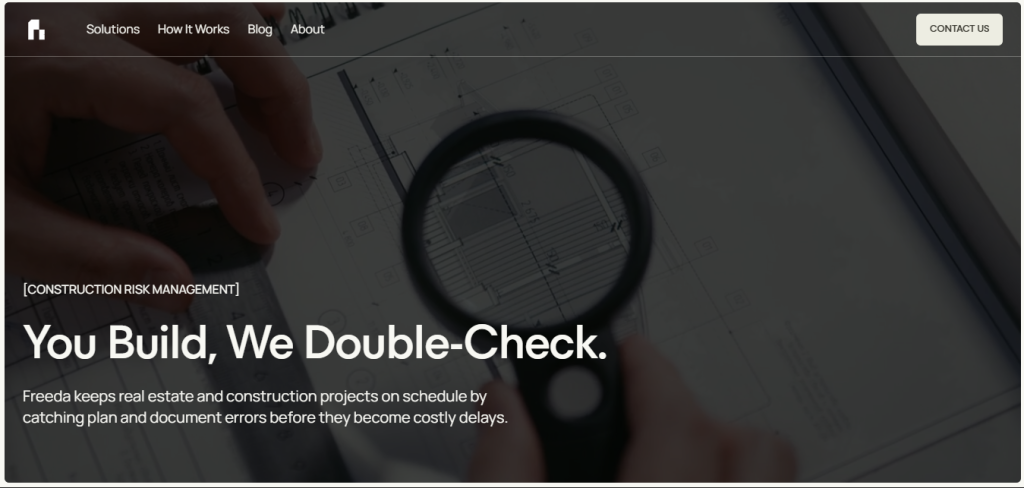Freeda Raises $3.9 Million to Reimagine How Construction Teams Collaborate
November 9, 2025
byFenoms Startup Research

Freeda, a fast-rising startup transforming how construction professionals communicate and manage projects, has raised $3,912,210 in its Seed Round. The round was led by Frst and Brick & Mortar Ventures, with participation from co-founders Peter Starr, Augustin Perraud, Charles Albert Desbaux, and Mariano Rodríguez.
This funding marks a major step forward for Freeda’s mission to bring digital harmony to the construction industry - one of the world’s largest but least digitized sectors.
Building Better Communication in Construction
At its core, Freeda is building the modern workspace for construction teams, combining chat, document management, and real-time updates into one seamless platform. In an industry where projects span years, involve hundreds of subcontractors, and depend on split-second coordination, Freeda eliminates the silos that slow teams down.
Unlike traditional project-management tools that focus solely on reporting or document storage, Freeda integrates conversation and execution. Every message, task, and file is tied to an actionable workflow - helping construction companies cut delays, reduce rework, and stay on budget.
“Construction is a team sport,” the founders emphasize. “But communication often feels like a game of telephone. Freeda makes sure everyone - from site managers to architects - operates from the same source of truth.”
The Construction Tech Landscape
The global construction sector accounts for roughly 7 percent of global economic output, generating about $13 trillion annually. Yet, despite its scale, the industry’s productivity has grown by only about 1 percent per year over the past two decades - five times slower than the global economy.
The gap between potential and performance is now driving a wave of digital investment. The construction-tech (ConTech) market is expected to expand from $7 billion in 2025 to nearly $30 billion by 2035, growing at a 16.9 percent CAGR. Similarly, the construction software market is projected to more than double by 2034, surpassing $9 billion in global revenue.
For context, the construction industry has historically spent less than 1 percent of its revenue on IT, making it one of the least digitized sectors. This underinvestment leaves enormous room for startups like Freeda to modernize how teams coordinate, communicate, and deliver.
Why Freeda Matters Now
Every missed message in construction has a price. Studies show that 48% of rework costs stem directly from miscommunication or bad data sharing. Freeda is built to end that - transforming messy chat threads into precise, traceable project intelligence.
Where competitors build tools, Freeda builds alignment. It isn’t just another app for task tracking - it’s a behavioral bridge that makes information flow frictionless between architects, engineers, and site crews.
This is where Freeda’s approach offers a powerful insight for founders. The company doesn’t chase disruption by replacing legacy systems; it wins by quietly owning the layer every stakeholder depends on - communication. That subtle distinction is the new foundation of defensibility.
Founders often believe disruption means reinventing the industry from the ground up. But the smarter play, as Freeda demonstrates, is to become the connective tissue that legacy players can’t operate without. Freeda doesn’t compete with project software like Procore - it complements it, embedding itself into the daily habits of workers who actually build.
This is the kind of leverage that transforms early startups into infrastructure companies. When your product becomes the unseen layer powering an industry’s workflow - whether that’s data routing in logistics, compliance tracking in fintech, or communication in construction - you stop being an app and start becoming architecture.
That’s why Freeda’s model resonates so strongly with investors. It embodies the evolution from SaaS utility to operational backbone - a shift defining the most valuable B2B startups of this decade.
The Investors Behind Freeda’s Growth
Freeda’s backers represent two of the most influential forces in global ConTech investing. Brick & Mortar Ventures, based in San Francisco, is the world’s first venture firm dedicated entirely to construction technology. Its portfolio includes sector giants such as Procore, Built Robotics, and Alice Technologies.
Frst, one of France’s most respected early-stage funds, adds deep expertise in scaling SaaS platforms from Europe to the U.S. Their combined support positions Freeda not just as a tool, but as a category-defining platform for digital construction management.
Team and Vision
Freeda’s co-founders - Peter Starr, Augustin Perraud, Charles Albert Desbaux, and Mariano Rodríguez - bring together engineering, architecture, and operations expertise. Their shared vision is to make construction communication as fluid and reliable as the buildings it produces.
Their product roadmap includes AI-assisted task recognition, automated compliance tracking, and multilingual site communication - a critical edge in global projects that often span multiple contractors and languages.
Market Opportunity and Outlook
According to Allied Market Research, the global project-management software market for construction is projected to exceed $16 billion by 2031, growing at nearly 10% CAGR. Moreover, 70% of contractors report plans to increase technology adoption in the next two years.
Freeda’s timing is ideal: construction productivity is under unprecedented pressure from inflation, material shortages, and green-building regulations. By reducing miscommunication - a factor responsible for 48% of rework costs, according to Autodesk - Freeda could deliver tangible bottom-line improvements across the construction value chain.
What’s Next for Freeda
With its $3.9 million raise, Freeda plans to expand its development team, enhance integrations with popular tools like Procore and Autodesk Build, and pilot large-scale implementations across European and U.S. construction firms.
The startup’s long-term goal is to evolve into the central communication hub for the built world - a platform where every instruction, file, and insight lives in one intelligent ecosystem.
As the global construction industry modernizes, Freeda’s mission goes beyond software. It’s about ensuring that the world’s next generation of infrastructure is built not just with better materials - but with better coordination.









